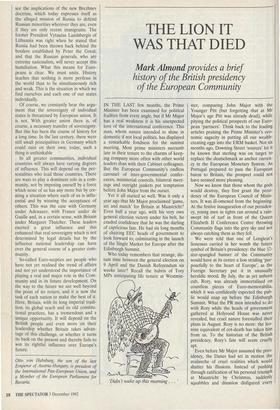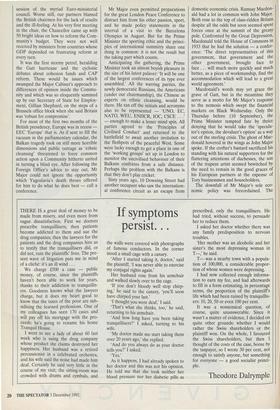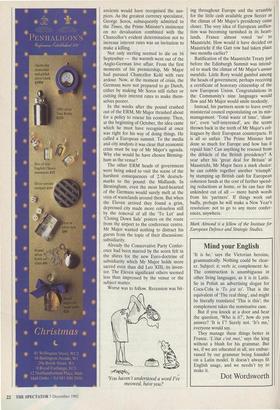THE LION IT WAS THAT DIED
Mark Almond provides a brief histog of the British presidency of the European Community
IN THE LAST few months, the Prime Minister has been examined for political frailties from every angle, but if Mr Major has a real weakness it is his unexpected love of the international conference. This man, whom nature intended to shine in domestic if not local politics, has displayed a remarkable fondness for the summit meeting. Most prime ministers succumb late in their tenure to the charms of keep- ing company more often with other world leaders than with their Cabinet colleagues. But the European Community's endless carousel of inter-governmental confer- ences, ministerial councils, bilateral meet- ings and outright junkets put temptation before John Major from the outset.
Yet it all started so well. Was it only a year ago that Mr Major proclaimed 'game, set and match' for Britain at Maastricht? Even half a year ago, with his very own general election victory under his belt, he exuded confidence that he was the darling of capricious fate. He had six long months of chairing EEC heads of government to look forward to, culminating in the launch of the Single Market for Europe after the Edinburgh Summit.
Who today remembers that strange, dis- tant time between the general election on 9 April and the Danish Referendum six weeks later? Recall the hubris of Tory MPs anticipating life tenure at Westmin-
'Didn't wake up this morning . . . '
ster, comparing John Major with the Younger Pitt (but forgetting that at Mr Major's age Pitt was already dead), while pitying the political prospects of our Euro- pean 'partners'. Think back to the leading articles praising the Prime Minister's eco- nomic sagacity in putting all our wealth- creating eggs into the ERM basket. Not six months ago, Downing Street 'sources' let it be known that sterling was on target to replace the deutschmark as anchor curren- cy in the European Monetary System. As Portugal prepared to pass the European baton to Britain, the prospect could not have seemed more pleasing.
Now we know that those whom the gods would destroy, they first grant the presi- dency of the European Council of Minis- ters. It was ill-omened from the beginning. At the festive inauguration of our presiden- cy, young men in tights ran around a rain- swept bit of turf in front of the Queen Elizabeth II Conference Centre throwing Community flags into the grey sky and not always catching them as they fell.
We were told that one of Longleat's lionesses carried in her womb the future symbol of Britain's presidency: the blue 12- star-spangled banner of the Community would have at its centre a lion striding 'pur- posefully to the heart of Europe', as the Foreign Secretary put it in unusually heraldic mood. By July, the as yet unborn cub, Rory, was already immortalised on countless pieces of Euro-memorabilia, which it was confidently expected the pub- lic would snap up before the Edinburgh Summit. What the PR men intended to do with Rory while the heads of government gathered at Holyrood House was never revealed, but cruel nature forestalled their plans in August. Rory is no more: the leo- nine equivalent of cot-death has taken him from us. To the historian of the British presidency, Rory's fate will seem cruelly apt.
Even before Mr Major assumed the pres- idency, the Danes had set in motion the avalanche of cruel realities which would shatter his illusions. Instead of pushing through ratification of his personal triumph at Maastricht by Christmas, suddenly squabbles and disunion disfigured every session of the myriad Euro-ministerial council. Worse still, our partners blamed the British chairmen for the lack of results and the ill-feeling. At his very first meeting in the chair, the Chancellor came up with 50 bright ideas on how to reform the Com- munity's budget. They were not well received by ministers from countries whose GDP depended on frustrating reform at every turn.
It was the first stormy petrel, heralding the Gatt hurricane and the cyclonic debates about cohesion funds and CAP reform. These would be issues which swamped the Major Cabinet's approach to differences of opinion inside the Commu- nity and which was so eloquently summed up by our Secretary of State for Employ- ment, Gillian Shephard, on the steps of a Brussels office block when she said Britain was 'robust for compromise'.
For most of the first two months of the British presidency, Europe was in recess — EEC 'Europe' that is. As if sent to fill the vacuum in the pailiamentary calendar, the Balkan tragedy took on still more horrible dimensions and public outrage as 'ethnic cleansing' threatened to force common action upon a Community hitherto united in turning a blind eye. After following the Foreign Office's advice to stay out, Mr Major could not ignore the opportunity which Yugoslavia's death throes offered for him to do what he does best — call a conference. Mr Major even permitted preparations for the great London Peace Conference to distract him from his other passion, sport, and he made policy statements in the interval of a visit to the Barcelona Olympics in August. But for the Prime Minister the sporting ethic and the princi- ples of international summitry share one thing in common: it is not the result but the taking part which counts.
Anticipating the gathering, the Prime Minister took an almost boyish pleasure in the size of his latest palaver: 'It will be one of the largest conferences of its type ever assembled.' All the warring parties, the newly democratic Russians, the Americans (under our chairmanship), the Chinese as experts on ethnic cleansing, would be there. He ran off the initials and acronyms also to be represented — `UNO, EC, NATO, WEU, ENHCR, IOC, CSCE .
— enough to make a lesser mind spin. All parties agreed to the 'Principles of Civilised Conduct' and returned to the battlefield to await another invitation to the fleshpots of the peaceful West. Some were lucky enough to get a place in one of the 'working groups' set up in London to monitor the uncivilised behaviour of their Balkans confreres from a safe distance. Perhaps the problem with the Balkans is that they don't play cricket.
Sixty years ago, 10 Downing Street had another occupant who saw the internation- al conference circuit as an escape from domestic economic crisis. Ramsay Macdon- ald had a lot in common with John Major. Both rose to the top of class-ridden Britain despite all the odds but soon seemed spent forces once at the summit of the greasy pole. Confronted by the Great Depression, Macdonald told the House of Commons in 1933 that he had the solution — a confer- ence: 'The direct representatives of this government, that government and the other government, brought face to face. . . will much more quickly and much better, as a piece of workmanship, find the accommodation which will lead to a great world agreement.'
Macdonald's words may yet grace the grave of Gatt, but in the meantime they serve as a motto for Mr Major's response to the nemesis which swept the financial markets on Black Wednesday. Only the Thursday before (10 September), the Prime Minister tempted fate by thrice denying that he would take the 'specula- tor's option, the devaluer's option' as a way out of the sterling crisis. The ghost of Mac- donald hovered in the wings as John Major spoke. If the crofter's bastard sacrificed his standing with his natural supporters for the flattering attentions of duchesses, the son of the trapeze artist seemed bewitched by the need to remain in the good graces of his European partners at the expense of Tory businessmen and householders.
The downfall of Mr Major's sole eco- nomic policy was foreordained. The ancients would have recognised the aus- pices. As the greatest currency speculator, George Soros, subsequently admitted to the Times, the Prime Minister's insistence on no devaluation combined with the Chancellor's evident determination not to increase interest rates was an invitation to make a killing.
Not only sterling seemed to die on 16 September — the warmth went out of the Anglo-German love affair. From the first moments of his premiership, Mr Major had pursued Chancellor Kohl with rare ardour. Now, at the moment of crisis, the Germans were not prepared to go Dutch, either by making Mr Soros still richer or cutting their interest rates to make them- selves poorer.
In the weeks after the pound crashed out of the ERM, Mr Major thrashed about for a policy to rescue his economy. Then, at the beginning of October, the idea came which he must have recognised at once was right for his way of doing things. He called a European summit. To the media and city analysts it was clear that economic crisis must be top of Mr Major's agenda. Why else would he have chosen Birming- ham as the venue?
The other ERM heads of government were being asked to visit the scene of the harshest consequences of 2.96 deutsch- marks to the pound: the Midlands. In Birmingham, even the most hard-hearted of the Germans would surely melt at the vista of wastelands around them. But when the Eleven arrived they found a grim, depressed city made more colourless still by the removal of all the 'To Let' and 'Closing Down Sale' posters on the route from the airport to the conference centre. Mr Major wanted nothing to distract his guests from the topic of their discussions: subsidiarity.
Already the Conservative Party Confer- ence had been marred by the scorn felt in the shires for the new Euro-doctrine of subsidiarity which Mr Major holds more sacred even than did Leo XIII, its inven- tor. The Eleven significant others seemed less than impressed by the venue or the subject matter.
Worse was to follow. Recession was bit- 'You haven't understood a word I've meowed, have you? ing throughout Europe and the scramble for the little cash available grew fiercer as the climax of Mr Major's presidency came closer. The very idea of European unifica- tion was becoming tarnished in its heart- lands. France almost voted 'no' to Maastricht. How would it have decided on Maastricht if the Gatt row had taken place two months earlier?
Ratification of the Maastricht Treaty just before the Edinburgh Summit was intend- ed to mark the climax of Mr Major's annus mirabilis. Little Rory would gambol among the heads of government, perhaps receiving a certificate of honorary citizenship of the new European Union. Congratulations in the Community's nine languages would flow and Mr Major would smile modestly.
Instead, his partners seem to leave every ministerial council expostulating on its mis- management. 'Total waste of time', 'disas- ter', even 'self-interested', are the terms thrown back in the teeth of Mr Major's col- leagues by their European counterparts. It is all so unfair. The Prime Minister has done so much for Europe and how has it repaid him? Can anything be rescued from the debacle of the British presidency? A year after his 'great deal for Britain' at Maastricht, Mr Major faces a stark choice: he can cobble together another 'triumph' by stumping up British cash for European cohesion funds at the cost of further spend- ing reductions at home, or he can face the unkindest cut of all — more harsh words from his 'partners'. If things work out badly, perhaps he will make a New Year's resolution: not to go to any more confer- ences, anywhere.
Mark Almond is a fellow of the Institute for European Defence and Strategic Studies.
Mind your English
'It is he,' says the Victorian heroine, grammatically. Nothing could be clear- er. Subject: it; verb: is; complement: he. The construction is unambiguous in other living languages, as it is in Latin. So in Polish an advertising slogan for Coca-Cola is 'To jest to'. That is the equivalent of 'The real thing', and might be literally translated 'This is this'; the complement takes the nominative case.
But if you knock at a door and hear the question, 'Who is it?', how do you answer? 'It is I'? Surely not. It's me,' everyone would say.
They manage these things better in France. `L'etat c'est moi,' says the king without a blush for his grammar. But we, if we are educated at all, are embar- rassed by our grammar being founded on a Latin model. It doesn't always fit English usage, and we needn't try to make it.
Dot Wordsworth












































































 Previous page
Previous page